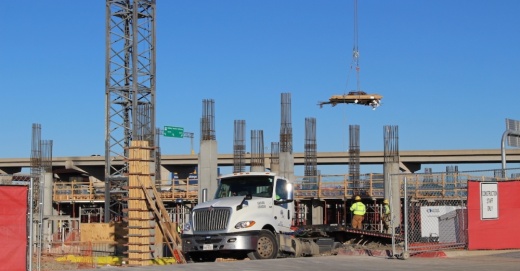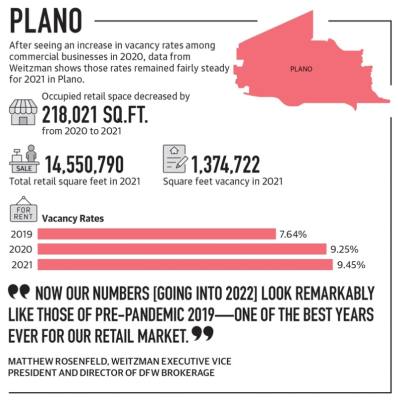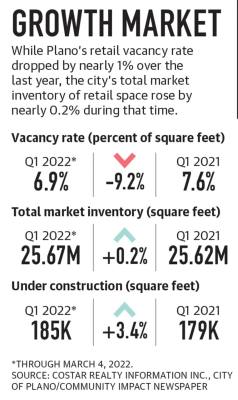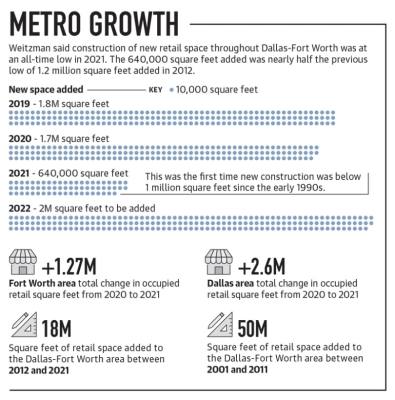Once a website was set up, Lyla’s owner Meagan Wauters said the page brought in nearly 50% of her revenues before people started feeling comfortable shopping in person again. And while that in-person traffic is now even better than it was before the pandemic, she said e-commerce still makes up nearly 15% of Lyla’s revenues.
“Store pickups have slowed down because people are excited to get out, but people are still utilizing it,” Wauters said.
That return to in-person shopping is happening throughout the Dallas-Fort Worth metroplex, according to Texas-based commercial real estate firm Weitzman.
“We’re in a much better place today [than March 2020],” Weitzman Executive Vice President Michelle Caplan said during the firm’s annual forecast that was livestreamed in January. “We’ve navigated risk and achieved one of the greatest market turnarounds ever.”
As part of its report, Weitzman noted construction of new business space was at an all-time low in 2021, with just 640,000 square feet added. That was nearly half the previous record low of 1.2 million square feet built in 2012, according to Matthew Rosenfeld, Weitzman executive vice president and director of DFW brokerage.
However, increased demand for retail space and rising occupancy rates are expected to help turn things around in 2022, according to the forecast.
“Based on what’s in the pipeline, we expect [brand new] construction to total approximately 2 million square feet [in 2022],” Caplan said. “That’s more than double the 2021 total, but it remains on the conservative side.”
The Weitzman forecast also found retail occupancy was at 93.5% throughout the region at the end of 2021. That rate was the third highest total the firm has recorded for DFW, just below its previously recorded highs of nearly 94% in 2019 and almost 95% in 1981.The firm’s data is based on more than 1,400 shopping centers totaling more than 200 million square feet of retail space across the metroplex. Weitzman’s forecast for this year expects retail occupancy to increase to 95%.

The retail leasing market was also the third strongest the firm has seen in 22 years, according to Rosenfeld.
“This is [a] complete reversal from 2020, when pandemic-related closures resulted in vacancy jumping by more than 4 million square feet,” Rosenfeld said during the January livestream. “Now our numbers [going into 2022] look remarkably like those of pre-pandemic 2019—one of the best years ever for our retail market.”
Adapting in Plano
Kelle Marsalis, Plano Chamber of Commerce president and CEO, said the pandemic has accelerated issues, such as staffing shortages and supply chain concerns, for many retailers.
“I have seen a lot of our smaller businesses ... offer more online ordering and online purchasing [over the last two years],” Marsalis said. “That is something that was probably always going to happen, but [the pandemic] has definitely sped up people’s willingness to take that jump.”
Plano is also home to a number of corporate and regional headquarters for companies, such as Toyota Motor North America and Liberty Mutual Insurance. Marsalis said companies like those are now offering more flexibility in workplaces for employees.
“You see more hiring in nontraditional sectors, like stay-at-home moms, and [a] willingness to work with folks based on the need for talent over needing someone whose schedule is wide open,” she said.
That shift in work environments is also being incorporated into the design of new apartments and townhomes, according to Matt Enzler, a senior managing director with multifamily development company Trammell Crow Residential. The company has built multifamily developments in Plano and throughout the metroplex.
“We’re adding more home office-type options, whether it’s a full dedicated study or if it’s just adding a spot ... for a [personal] workspace,” Enzler said. “Then outside the unit we’ve added, for all of our new developments, ... more workspace [for residents].”
While Trammell Crow was incorporating many of these options into designs even before the pandemic began, Enzler said the company has put more of an emphasis on these features, and he expects that will continue.
“I don’t think there’s any question people will have a more flexible work schedule and more work from home [opportunities] ... so we need to be able to provide [work spaces] for them,” he said.
‘Tech and mortar’
Rosenfeld said grocery stores throughout the region have led the way in using digital tools to help physical retailers meet changing customer needs. That is an approach Weitzman refers to as “tech and mortar.”
“Without a doubt, COVID[-19] has transformed grocery shoppers’ behavior, and brick-and-mortar locations [that] are offering delivery and curbside pickup [are] benefiting,” Rosenfeld said.
The region is seeing expansions from grocers, such as Kroger, Sprouts and H-E-B, according to the Weitzman forecast. H-E-B has announced plans to open new stores in Plano and Frisco in 2022 and McKinney in 2023.
The demand for Walmart’s pickup and delivery services has led the company to increase its order fulfillment capacity by 40% over the last two years, according to Lauren Willis, the retailer’s communications director for Texas.
“The pandemic permanently changed how customers shop,” she said via email.
To help meet customers’ new shopping patterns, Walmart is adding market fulfillment centers to many existing stores, including one in Plano. These centers will help meet the demand for Walmart’s curbside pickup and delivery services throughout the metroplex.
“These local fulfillment centers are built within or added to a store to hold thousands of items customers shop [for] the most—from pantry, frozen and chilled foods to consumables and electronics—all in one flexible space,” Willis said.
Looking ahead
While not all the pandemic-related changes retailers have made are likely to last, Marsalis said she believes the emphasis on tech and mortar is here to stay for Plano businesses.
“I think it will be very hard for businesses to continue to compete if they don’t continue to offer [online] services,” she said.
Location data analytics firm Placer.ai tracks consumer foot traffic for retail and real estate companies using mobile device data. CEO and co-founder Noam Ben-Zvi said he believes shopping centers are “here to stay.”
“People don’t want to sit at home and buy everything,” he said during the Weitzman livestream in January.
Marsalis said that is especially true for unexpected items, such as medicine, or personalized gifts for events, such as birthdays and holidays.
“We’re still a society that needs things immediately, in some cases,” she said. “When you’re sick, you need to go to the store and get the medicine right then. But I think [the pandemic] has really taught consumers how to plan ahead a little more.”








